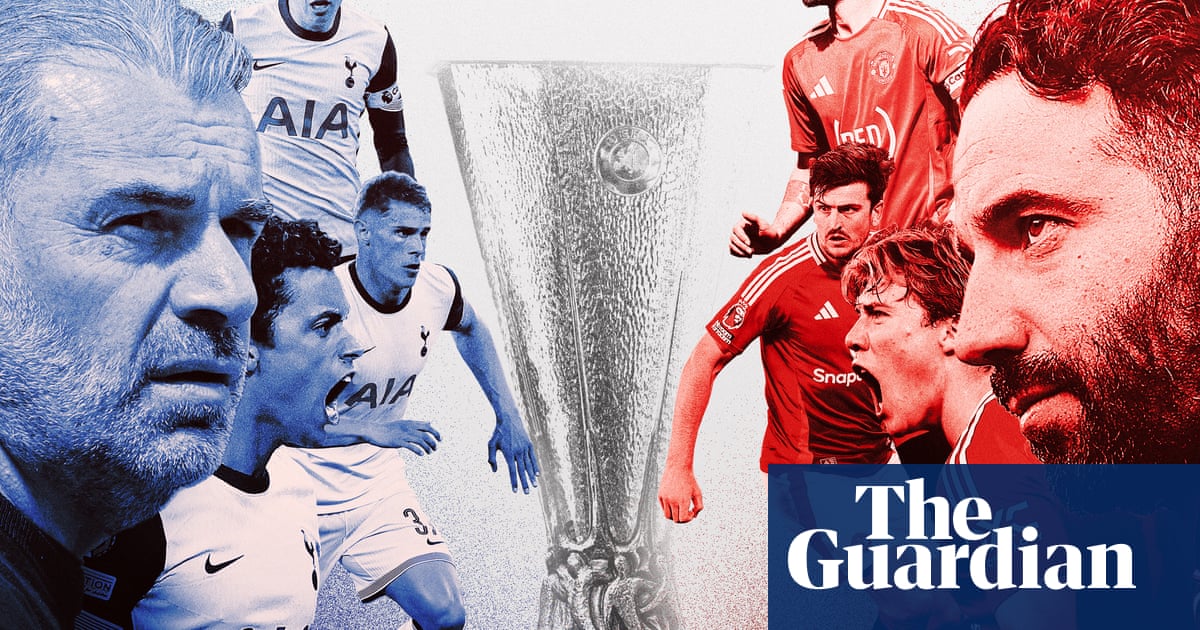Gatwick on Tuesday morning was full of Spurs fans. They were in the Pret a Manger, they were in the Pizza Express, they were in the Wagamama, but mostly they were standing gawping at the destination board, which featured a baffling number of Vueling flights to Bilbao, a squeezing of the schedule that led to inevitable delays and confusion.
The queue for the three open booths at passport control in Bilbao was a vast python of white shirts, speckled with the occasional tree green or purple. The bus into town was almost entirely Spurs, with a handful of businessmen and a bewildered older couple returning from their holidays, who admitted they had no idea their city was hosting a major European final.
In fairness, it has not felt much like a major European final. This is 16th against 17th in the Premier League, a battle of two sides who have each won one of their past 10 league games. As such, it has been regarded as an indictment of the inequitable distribution of resources in the modern world and something from a Victorian freak show, simultaneously an English boot grinding its studs forever into the face of Europe and a bout between a blind bear and a pair of three-legged badgers. None of which is entirely unfair, and yet it is a major European final, as the mass migration of excited fans attests.
That a final could comprise two such struggling teams is undeniably funny, but the game matters. For Tottenham, this could be a first trophy since 2008 and a first European trophy since 1984; for United, it could, inexplicably, be a third piece of silverware in successive seasons, and a seventh European trophy.
Neither side will need reminding that their ostensibly more successful local rivals have won nothing this season.
Almost more importantly in the remorselessly capitalistic environment of the modern game, victory on Wednesday would secure passage to next season’s Champions League, with all the financial benefits that will bring. It could rival the Championship playoff final as the most valuable game in English football. The way potential qualification for the Champions League has been touted as a means of salvaging dismal seasons is itself indicative of the way football has been financialised.
A trophy may havemeant the world for Crystal Palaceon Saturday, but for at least some at United and Spurs (although not Ange Postecoglou, as he was determined to point out), the Europa League feels like a means to a more lucrative ends; winning silverware in order to generate the revenue that will allow them to generate more revenue. The game, as Danny Blanchflower nearly said, is about glory, it is about doing things in style and with a flourish, about going out and creating sustainable revenue streams for the future.
When Postecoglou arrived at Tottenham, heseemed a natural fit. His attitude to the game had been shaped by Ferenc Puskas, who coached him at South Melbourne, and there was a stylistic congruence between Arthur Rowe’s Tottenham of the early 1950s, which established the push‑and-run style, and the ethos of Hungarian football in the same period.
For all Postecoglou’s cussed insistence that the way he plays is the way he plays, Spurs’ best performances this season have been in away games when they have played in a style that would not be described as Angeball. When they beatManchester City 4-0 at the Etihad Stadium, it was by playing on the counter and controlling the game in the second half. The Europa League winsat Eintracht FrankfurtandBodø/ Glimtwere almost like tactical plans devised by José Mourinho, stifling their opponents and assuming superior quality or physicality would tell in the end.
Sign up toFootball Daily
Kick off your evenings with the Guardian's take on the world of football
after newsletter promotion
Which presents Postecoglou with a conundrum. Tottenham have beaten United three times this season: twice with classic Angeball and once in a grim scrap when neither side played remotely well. Does he go with what workedat Old Trafford in the leagueandat home in the Carabao Cupor does he go with what has worked in Europe and opt for something more cautious?
He may not have much option. Spurs do not have the natural advantage they had over Frankfurt and Bodø/Glimt, but neither are they likely to have their three most creative midfielders with James Maddison and Dejan Kulusevski out and Lucas Bergvall a major doubt. That probably means Yves Bissouma and Rodrigo Bentancur sitting with Pape Matar Sarr driving forward.
It had looked as though Postecoglou’s team without a midfield would be facing Ruben Amorim’s team without a defence, although with Leny Yoro and Diogo Dalot back in training the injury situation at United is not as acute as it had appeared. If there is an explanation for the disparity in United’s European and domestic form this season, it is probably that the lower pace of theEuropa Leagueallows players such as Casemiro and Harry Maguire to play under less immediate physical pressure. The dilemma for Postecoglou, then, is how to press them without losing the defensive structure that saw Spurs through the past two rounds.
Despite all the noise around it, the talk of finals of the undeserving and the economic rewards on offer, this is, almost despite itself, a major final. Somebody will win a trophy and whatever else that means it will be celebrated on the night and go down in posterity. Football is made of this.
